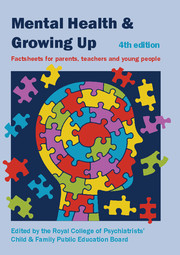Book contents
- Frontmatter
- Contents
- Contributors
- Factsheets for young people
- Factsheets for parents, carers and anyone who works with young people
- 1 Good parenting
- 2 The restless and excitable child
- 3 Dealing with tantrums
- 4 Children who soil or wet themselves
- 5 Sleep problems in childhood and adolescence
- 6 Behavioural problems and conduct disorder
- 7 Attention-deficit hyperactivity disorder (ADHD)
- 8 The child with general learning disability
- 9 Specific learning difficulties
- 10 Autism and Asperger syndrome
- 11 Depression in children
- 12 Worries and anxieties: helping children to cope
- 13 Divorce or separation of parents: the impact on children and adolescents
- 14 Death in the family: helping children to cope
- 15 The emotional cost of bullying
- 16 Traumatic stress in children
- 17 Domestic violence: its effects on children
- 18 Child abuse and neglect: the emotional effect
- 19 Drugs and alcohol: what parents need to know
- 20 Self-harm in young people
- 21 Psychosis
- 22 Schizophrenia
- 23 Bipolar disorder in children and adolescents
- 24 Obsessive–compulsive disorder in children and young people
- 25 Eating disorders in young people
- 26 Chronic physical illness: the effects on mental health
- 27 Medically unexplained physical symptoms
- 28 Chronic fatigue syndrome: helping your child get better
- 29 Parental mental illness: the problems for children
- 30 Who's who in CAMHS
5 - Sleep problems in childhood and adolescence
from Factsheets for parents, carers and anyone who works with young people
Published online by Cambridge University Press: 02 January 2018
- Frontmatter
- Contents
- Contributors
- Factsheets for young people
- Factsheets for parents, carers and anyone who works with young people
- 1 Good parenting
- 2 The restless and excitable child
- 3 Dealing with tantrums
- 4 Children who soil or wet themselves
- 5 Sleep problems in childhood and adolescence
- 6 Behavioural problems and conduct disorder
- 7 Attention-deficit hyperactivity disorder (ADHD)
- 8 The child with general learning disability
- 9 Specific learning difficulties
- 10 Autism and Asperger syndrome
- 11 Depression in children
- 12 Worries and anxieties: helping children to cope
- 13 Divorce or separation of parents: the impact on children and adolescents
- 14 Death in the family: helping children to cope
- 15 The emotional cost of bullying
- 16 Traumatic stress in children
- 17 Domestic violence: its effects on children
- 18 Child abuse and neglect: the emotional effect
- 19 Drugs and alcohol: what parents need to know
- 20 Self-harm in young people
- 21 Psychosis
- 22 Schizophrenia
- 23 Bipolar disorder in children and adolescents
- 24 Obsessive–compulsive disorder in children and young people
- 25 Eating disorders in young people
- 26 Chronic physical illness: the effects on mental health
- 27 Medically unexplained physical symptoms
- 28 Chronic fatigue syndrome: helping your child get better
- 29 Parental mental illness: the problems for children
- 30 Who's who in CAMHS
Summary
How much sleep does a child need?
The amount of sleep needed gradually decreases from infancy to adulthood. Every child is different but as a general rule of thumb:
• toddlers need about 12–14 hours’ sleep (including daytime naps)
• pre-schoolers (aged 3–5) need 11–12 hours’ sleep
• school-age children need 10–11 hours’ sleep
• teenagers need 9–10 hours’ sleep.
Why can't my child sleep?
There can be different reasons.
• Very young children often fear being left alone at night. This is called ‘separation anxiety’ and is normal at a young age.
• Bedtime fears – many young children are afraid of the dark.
• Bad habits – napping too much during the day.
• ‘I'm not sleepy’ – you might find that when your child gets very tired, they get irritable, aggressive or even overactive (hence the phrase ‘overtired’).
Daytime sleepiness
This can simply be caused by your child not getting enough sleep at night. They could be going to bed too late or having problems sleeping, for reasons described above.
There are a number of less common reasons for daytime sleepiness.
• Large tonsils and adenoids at the back and sides of the throat can cause breathing difficulties that can wake a child many times each night. The child may not remember waking up, but you may notice that they snore loudly and sleep restlessly. This is called obstructive sleep apnoea. An operation to remove the tonsils and adenoids may be needed.
• Restless legs syndrome is a condition where the child complains of crawling feelings or ‘growing pains’ in their legs that make them want to keep moving them, which stops them getting to sleep.
• Narcolepsy is an unusual condition that causes unpredictable attacks of sleep during the day. People with narcolepsy may also have sudden attacks of weakness – this is called cataplexy.
• In teenagers, drug or alcohol misuse is sometimes a factor.
• Some young people who have depression sleep more than usual.
Nightmares
Most children have nightmares occasionally. These are vivid and frightening dreams. Children will usually remember the dream, and will need to be comforted so that they can get back to sleep.
- Type
- Chapter
- Information
- Mental Health and Growing UpFactsheets for Parents, Teachers and Young People, pp. 58 - 60Publisher: Royal College of PsychiatristsPrint publication year: 2013



